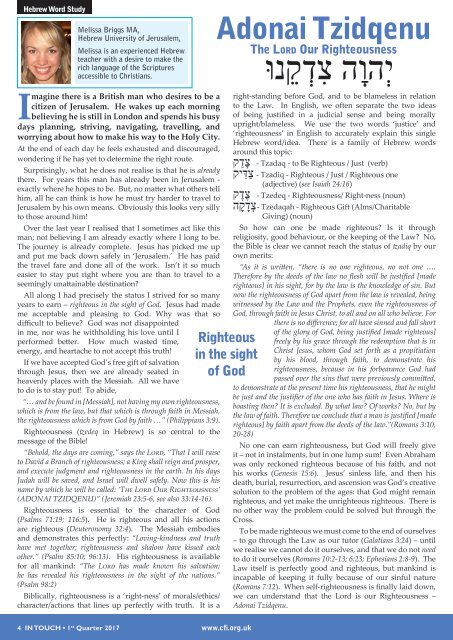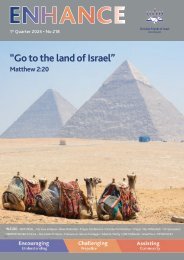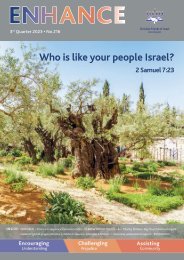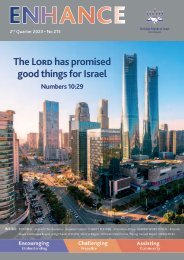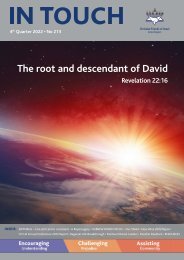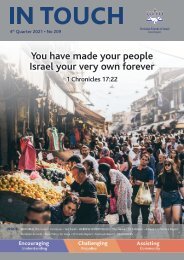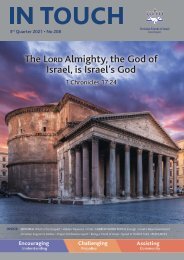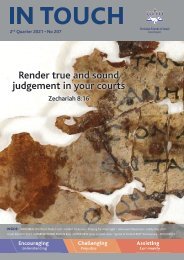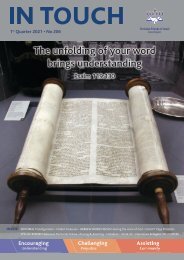In Touch Quarter 1 - 2017
CFI UK's regular quarterly magazine
CFI UK's regular quarterly magazine
You also want an ePaper? Increase the reach of your titles
YUMPU automatically turns print PDFs into web optimized ePapers that Google loves.
Hebrew Word Study<br />
Melissa Briggs MA,<br />
Hebrew University of Jerusalem,<br />
Melissa is an experienced Hebrew<br />
teacher with a desire to make the<br />
rich language of the Scriptures<br />
accessible to Christians.<br />
Adonai Tzidqenu<br />
The Lord Our Righteousness<br />
יְהוָה צִדְקֵנּו<br />
Imagine there is a British man who desires to be a<br />
citizen of Jerusalem. He wakes up each morning<br />
believing he is still in London and spends his busy<br />
days planning, striving, navigating, travelling, and<br />
worrying about how to make his way to the Holy City.<br />
At the end of each day he feels exhausted and discouraged,<br />
wondering if he has yet to determine the right route.<br />
Surprisingly, what he does not realise is that he is already<br />
there. For years this man has already been in Jerusalem -<br />
exactly where he hopes to be. But, no matter what others tell<br />
him, all he can think is how he must try harder to travel to<br />
Jerusalem by his own means. Obviously this looks very silly<br />
to those around him!<br />
Over the last year I realised that I sometimes act like this<br />
man; not believing I am already exactly where I long to be.<br />
The journey is already complete. Jesus has picked me up<br />
and put me back down safely in ‘Jerusalem.’ He has paid<br />
the travel fare and done all of the work. Isn’t it so much<br />
easier to stay put right where you are than to travel to a<br />
seemingly unattainable destination?<br />
All along I had precisely the status I strived for so many<br />
years to earn – righteous in the sight of God. Jesus had made<br />
me acceptable and pleasing to God. Why was that so<br />
difficult to believe? God was not disappointed<br />
in me, nor was he withholding his love until I<br />
performed better. How much wasted time,<br />
energy, and heartache to not accept this truth!<br />
If we have accepted God’s free gift of salvation<br />
through Jesus, then we are already seated in<br />
heavenly places with the Messiah. All we have<br />
to do is to stay put! To abide,<br />
“… and be found in [Messiah], not having my own righteousness,<br />
which is from the law, but that which is through faith in Messiah,<br />
the righteousness which is from God by faith …” (Philippians 3:9).<br />
Righteousness (tzedeq in Hebrew) is so central to the<br />
message of the Bible!<br />
“Behold, the days are coming,” says the Lord, “That I will raise<br />
to David a Branch of righteousness; a King shall reign and prosper,<br />
and execute judgment and righteousness in the earth. <strong>In</strong> his days<br />
Judah will be saved, and Israel will dwell safely. Now this is his<br />
name by which he will be called: ‘The Lord Our Righteousness’<br />
(ADONAI TZIDQENU)” (Jeremiah 23:5-6, see also 33:14-16).<br />
Righteousness is essential to the character of God<br />
(Psalms 71:19; 116:5). He is righteous and all his actions<br />
are righteous (Deuteronomy 32:4). The Messiah embodies<br />
and demonstrates this perfectly: “Loving-kindness and truth<br />
have met together; righteousness and shalom have kissed each<br />
other.” (Psalm 85:10; 96:13). His righteousness is available<br />
for all mankind: “The Lord has made known his salvation;<br />
he has revealed his righteousness in the sight of the nations.”<br />
(Psalm 98:2)<br />
Biblically, righteousness is a ‘right-ness’ of morals/ethics/<br />
character/actions that lines up perfectly with truth. It is a<br />
right-standing before God, and to be blameless in relation<br />
to the Law. <strong>In</strong> English, we often separate the two ideas<br />
of being justified in a judicial sense and being morally<br />
upright/blameless.<br />
We use the two words ‘justice’ and<br />
‘righteousness’ in English to accurately explain this single<br />
Hebrew word/idea. There is a family of Hebrew words<br />
around this topic:<br />
(verb) - Tzadaq - to Be Righteous / Just צָדַ ק<br />
- Tzadiq - Righteous / Just / Righteous one צַדִּיק<br />
(adjective) (see Isaiah 24:16)<br />
(noun) - Tzedeq - Righteousness/ Right-ness צֶדֶ ק<br />
צְדָ קָ ה<br />
Righteous<br />
in the sight<br />
of God<br />
- Tzedaqah - Righteous Gift (Alms/Charitable<br />
Giving) (noun)<br />
So how can one be made righteous? Is it through<br />
religiosity, good behaviour, or the keeping of the Law? No,<br />
the Bible is clear we cannot reach the status of tzadiq by our<br />
own merits:<br />
“As it is written, “there is no one righteous, no not one ….<br />
Therefore by the deeds of the law no flesh will be justified [made<br />
righteous] in his sight, for by the law is the knowledge of sin. But<br />
now the righteousness of God apart from the law is revealed, being<br />
witnessed by the Law and the Prophets, even the righteousness of<br />
God, through faith in Jesus Christ, to all and on all who believe. For<br />
there is no difference; for all have sinned and fall short<br />
of the glory of God, being justified [made righteous]<br />
freely by his grace through the redemption that is in<br />
Christ Jesus, whom God set forth as a propitiation<br />
by his blood, through faith, to demonstrate his<br />
righteousness, because in his forbearance God had<br />
passed over the sins that were previously committed,<br />
to demonstrate at the present time his righteousness, that he might<br />
be just and the justifier of the one who has faith in Jesus. Where is<br />
boasting then? It is excluded. By what law? Of works? No, but by<br />
the law of faith. Therefore we conclude that a man is justified [made<br />
righteous] by faith apart from the deeds of the law.”(Romans 3:10,<br />
20-28)<br />
No one can earn righteousness, but God will freely give<br />
it – not in instalments, but in one lump sum! Even Abraham<br />
was only reckoned righteous because of his faith, and not<br />
his works (Genesis 15:6). Jesus’ sinless life, and then his<br />
death, burial, resurrection, and ascension was God’s creative<br />
solution to the problem of the ages: that God might remain<br />
righteous, and yet make the unrighteous righteous. There is<br />
no other way the problem could be solved but through the<br />
Cross.<br />
To be made righteous we must come to the end of ourselves<br />
– to go through the Law as our tutor (Galatians 3:24) – until<br />
we realise we cannot do it ourselves, and that we do not need<br />
to do it ourselves (Romans 10:2-13; 6:23; Ephesians 2:8-9). The<br />
Law itself is perfectly good and righteous, but mankind is<br />
incapable of keeping it fully because of our sinful nature<br />
(Romans 7:12). When self-righteousness is finally laid down,<br />
we can understand that the Lord is our Righteousness –<br />
Adonai Tzidqenu.<br />
4 IN TOUCH • 1 st <strong>Quarter</strong> <strong>2017</strong><br />
www.cfi.org.uk


